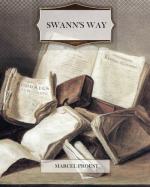|
This section contains 4,933 words (approx. 17 pages at 300 words per page) |

|
SOURCE: Mackenzie, Robin. “Proustian Doubles: Patterns of Duality and Multiplicity in À la recherche du temps perdu.” Forum for Modern Language Studies 38, no. 3 (July 2002): 291-301.
In the following essay Mackenzie explores the contradictory patterns of dualism and fragmentation in Proust's Remembrance of Things Past.
Man is not truly one, but truly two. I say two, because the state of my own knowledge does not pass beyond that point [and] I hazard the guess that man will be ultimately known for a mere polity of multifarious, incongruous and independent denizens.1
As readers of Proust's Correspondance, and indeed attentive readers of À la recherche, will be aware, Proust was a fervent admirer of Stevenson's fiction. Specific intertextual echoes of this admiration are not easy to find; if we are looking for traces of Stevenson's influence, or of Proust's reading of Stevenson, in À la recherche, we may have to settle for something more...
|
This section contains 4,933 words (approx. 17 pages at 300 words per page) |

|


